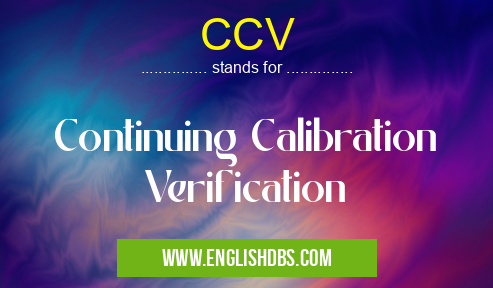What does CCV mean in PHYSICS
Continuing Calibration Verification (CCV) is a process used by laboratories to ensure that equipment and instruments are properly calibrated over time. CCV involves tracking the accuracy of measured data throughout the entire calibration cycle and verifying that these measurements stay within an acceptable range. This type of quality control helps ensure that laboratories are producing reliable and accurate results in a consistent manner.

CCV meaning in Physics in Academic & Science
CCV mostly used in an acronym Physics in Category Academic & Science that means Continuing Calibration Verification
Shorthand: CCV,
Full Form: Continuing Calibration Verification
For more information of "Continuing Calibration Verification", see the section below.
What it Does
The purpose of CCV is to ensure that laboratory instruments remain in working order and can accurately measure whatever they are intended to measure. By conducting regular testing and verification, any loss of accuracy or reliability due to age, wear, or other factors can be identified quickly before producing unreliable data. Laboratories use CCV to detect any malfunctions or out-of-calibration issues as soon as possible so that corrective action can be taken before the next test run. Without proper calibration, lab results could be inaccurate and unreliable which can lead to incorrect conclusions or decisions being made based on faulty information.
How it Works
CCV uses a variety of tests and verification techniques in order to determine whether an instrument is still providing accurate readings over time. Tests may include comparisons between different measuring devices, visual inspections for wear, electronic measurement probes, or temperature measurements for thermal drift or fluctuations. Once these tests have been conducted, laboratory staff can then analyze the results to determine if any changes have occurred since the last round of calibrations were performed. If discrepancies are observed or noticed, additional calibration can be done as necessary in order to bring the instrument back into line with its original specifications and accuracy levels.
Essential Questions and Answers on Continuing Calibration Verification in "SCIENCE»PHYSICS"
What is Continuing Calibration Verification?
Continuing Calibration Verification (CCV) is an ongoing process of periodic testing and verification to ensure that measuring instruments, systems, and processes are providing accurate and reliable results. It is an important quality assurance step for businesses in a wide variety of industries, from manufacturing to healthcare.
Why do I need CCV?
Ensuring accuracy and reliability of measurements is a critical measure of quality assurance. Without it, businesses can experience decreased efficiency due to wasted resources or inaccurate data that can impact decision-making. CCV makes sure that products and processes meet specified standards and customers receive consistent, reliable results.
How often should a business perform CCV?
The frequency of calibration depends on factors such as the environment the instrument is used in, its application, manufacturers’ recommendations and applicable standards and regulations. Most businesses find it beneficial to calibrate their equipment at least once per year.
What types of equipment does CCV apply to?
A wide variety of measuring equipment can benefit from CCV, including digital multimeters, scales, thermometers, torque wrenches, temperature controllers and more. It is advisable to check with the manufacturer for recommendations on calibration intervals for specific types of equipment.
What happens during a CCV test?
During the test procedure, technicians compare known reference points against readings taken by the device being tested to determine if it is giving accurate readings. If any discrepancies are found between the reference points and readings taken by the device being tested then corrective action may be necessary before the device can be put back into service.
Who should conduct a CCV test?
In order for results to be reliable, it's best if tests are conducted by trained technicians or engineers who have expertise in interpreting data from a variety of instruments. Make sure they have been trained specifically on your specific type(s) of devices so that they understand how they work in order to get accurate readings.
Final Words:
Continuing Calibration Verification is a critical aspect of quality control in today's laboratory environment because it helps guarantee that all instruments produce consistent and accurate results throughout their operational lifetime, no matter how long the project runs for or how many times it's recalibrated along the way. Using CCV not only improves reliability but also helps promote confidence in research findings by ensuring that data collected is reliable each step of the way until a conclusion has been reached.
CCV also stands for: |
|
| All stands for CCV |
